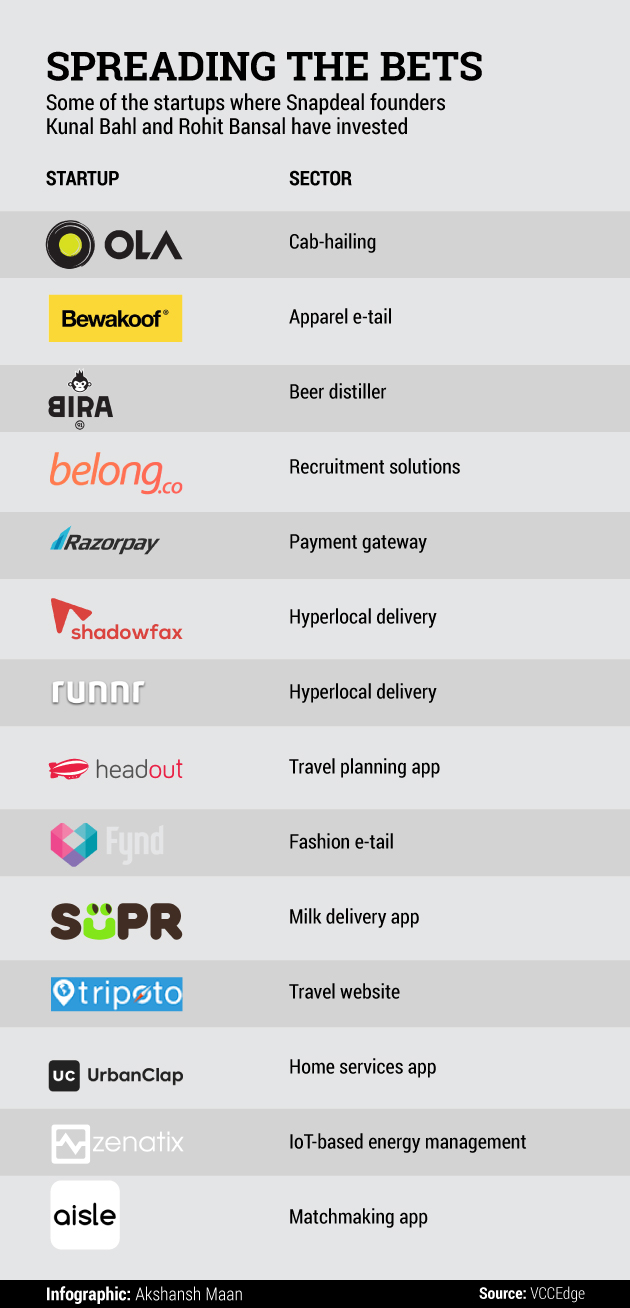In a media interview in 2014, Snapdeal co-founder and CEO Kunal Bahl reportedly said he saw early on that "his life was going to be a series of failures". Going by the upheavals Bahl has faced in his professional life since he set up an offline coupon startup in 2008 (and, before that, a detergent company in the US) to the floundering of his most celebrated venture Snapdeal, it would seem what he said then was a self-fulfilling prophecy.
He, however, said something else too in the interview. “…but then failures help build character,†he had supposedly remarked. In a way, wresting back the control of his flailing e-commerce company from the clutches of investors as powerful as Japan’s SoftBank Group Corp and homegrown Kalaari Capital, and deciding to go it alone yet again reflects an element of tenacity in Bahl’s character.
Last week, Bahl and his partner Rohit Bansal managed to prevail upon their investors, who were in a striking distance of selling Snapdeal to its larger rival Flipkart for about one-eighth of its year-ago valuation of $6.5 billion.
Those who fail to see Bahl’s new move—pivoting Snapdeal once again and going solo—as a sign of sound character can’t really be accused of being hard-nosed. He has done this about half-a-dozen times in the past. And, he’s failed as many times. And that journey of arduousness and failures is well-documented.
Going by the past and the inevitable pain Snapdeal 2.0 is faced with, the future for Bansal looks less than inspiring. Especially because it involves the future of thousands of employees who gave the company their proverbial blood and sweat over the years. If news reports are anything to go by, as many as 1,000 people, out of the 1,200 or so it currently employs, will be fired in an effort to keep Snapdeal afloat. Compare this with the 9000-plus it once employed, and it’s clear the company will be stripped to its bones.
In going solo, however, Bahl is also letting go of $30 million (a little under Rs 200 crore) that could have easily gone into his banks had he let Snapdeal slip under the Flipkart umbrella. It also means he will have to slum it out with little funds and almost no hope of replenishment anytime soon in a market that is more cut-throat than it ever was and investors less forgiving than they ever were.
Past continuous in future imperfect?
There are questions aplenty about Bahl’s new move. Why is he walking away from millions of dollars that he could have used to start a new venture with no baggage? How does he plan to revive Snapdeal? What eggs him on to bet on himself once again? What does he know about the future of Snapdeal that his investors don’t?
VCCircle reached out to Bahl to seek answers to a few such questions. He, however, said he will “speak at a later date, not nowâ€.

Bahl isn’t a reticent man. In fact, when the times were good, he did talk, and how. In August 2015, he made a rather audacious claim that Snapdeal would pip rival Flipkart to the top spot in 2015-16 in terms of gross merchandise value, a metric most online retailers swear by.
He had told a leading daily that Snapdeal had achieved $4 billion (Rs 26,000 crore) in gross merchandise value—up from just $1 billion in the previous year—and was well on its way to become the market leader.
“The one thing I am very, very clear about right now is that I think we are going to be No. 1 (in terms of sales) by March 2016,†Bahl had said. “I think we are going to beat Flipkart by then.â€
Needless to say, he was way off the mark. But then he had little reason to be humble. Having surmounted failure more than once, Snapdeal at its peak was definitely something to be proud of.
Not being humble is one thing, being reckless is quite another. And that is perhaps what may have contributed to Snapdeal’s downfall in the first place. Take, for instance, the rebranding exercise Snapdeal undertook in September 2016, by which time it had already begun ceding ground to Flipkart and the Indian arm of global e-commerce giant Amazon. It burnt Rs 200 crore to give itself little more than a new logo and a new jingle, a move that was widely criticised.
Its promoters also paid themselves generously. Just a month before Snapdeal re-branded itself, VCCircle had reported that Bahl and Bansal received a whopping Rs 46.5 crore each in compensation during 2014-15, making them the highest-paid executives at Indian unicorns, and the seventh-highest among all Indian companies. In fact, they made nearly nine times as much as Ola’s Bhavish Aggarwal, who came a distant second with an annual compensation of Rs 5.62 crore.
As for the sellers, for whom Bahl had sought to create “life changing†experiences, a good number of them are at loggerheads with Snapdeal, clamouring for their dues and threatening to move court against the founders.
The rights in the midst of wrongs
Even as they struggled to keep the Snapdeal train chugging, Bahl and Bansal chose to help others like them along the way. VCCircle trawled through its data analytics platform VCCEdge and found that the duo invested in as many as 32 startups. Some of the prominent ones include India’s largest cab-hailing app Ola, beer distiller Bira, payments solutions company Razorpay, travel website Tripoto and home services app Urbanclap, to name a few.
Analysts and industry-watchers say that despite all the odds, Bahl has two things going for him. First, the sale of payments platform FreeCharge, owned by Snapdeal’s parent Jasper Infotech Pvt. Ltd, to Axis Bank for Rs 385 crore has given the beleaguered e-commerce company some room for manoeuvrability. Second, he still has the backing of investors such as Nexus Venture Partners, even though others, such as Kalaari, have publicly chided the founders from walking away from the proposed merger.
Foolhardiness or strength of character, whatever one chooses to see in Bahl’s yet another attempt at landing on his feet, there is no denying that he is a curious man. And his story is far from over.







